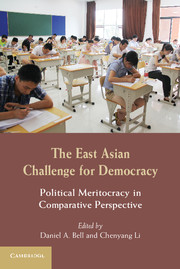Book contents
- Frontmatter
- Dedication
- Contents
- Contributing Authors
- Acknowledgments
- Introduction
- Section I The Theory of Political Meritocracy
- Section II The History of Political Meritocracy
- Section III Realizing Political Meritocracy Today
- 9 How East Asians View Meritocracy
- 10 Political Meritocracy in Singapore
- 11 Meritocracy and Political Liberalization in Singapore
- 12 China's Meritocratic Examinations and the Ideal of Virtuous Talents
- 13 Reflections on Political Meritocracy
- 14 Political Meritocracy and Direct Democracy
- Index
- References
9 - How East Asians View Meritocracy
A Confucian Perspective
Published online by Cambridge University Press: 05 June 2014
- Frontmatter
- Dedication
- Contents
- Contributing Authors
- Acknowledgments
- Introduction
- Section I The Theory of Political Meritocracy
- Section II The History of Political Meritocracy
- Section III Realizing Political Meritocracy Today
- 9 How East Asians View Meritocracy
- 10 Political Meritocracy in Singapore
- 11 Meritocracy and Political Liberalization in Singapore
- 12 China's Meritocratic Examinations and the Ideal of Virtuous Talents
- 13 Reflections on Political Meritocracy
- 14 Political Meritocracy and Direct Democracy
- Index
- References
Summary
HOW EAST ASIANS VIEW MERITOCRACY: A CONFUCIAN PERSPECTIVE
Since the fall of the Berlin Wall in 1989, numerous public opinion surveys have been conducted to monitor and compare how ordinary citizens react to the ideals of democratic politics and its practices. These surveys have revealed that an overwhelming majority of citizenries report preferring democracy to nondemocratic regimes. In ascertaining the relative preference of democracy to its alternatives, however, these previous studies have limited the alternatives to oppressive regime types, such as civilian and military dictatorship and one-party rule, and have failed to consider nonoppressive alternatives to democracy, such as meritocracy. Consequently, virtually nothing is known about how ordinary citizens, particularly those in authoritarian and new democracies, compare democracy with nonoppressive meritocratic government, which involves a variety of nonoppressive principles of governance, such as skill, wisdom, and virtue.
This study is designed to examine how the people of Confucian Asia compare the desirability of democracy with that of ethical meritocracy, a nonoppressive alternative to democracy. This is the system of government Confucius, Mencius, and their followers advocated more than two-and-a-half millennia ago as a means of building a peaceful and prosperous community known as datong shehui. Do most Confucian Asians remain attached to the principles of ethical meritocracy? If so, do they consider it to be a system of government inherently incompatible with democracy, the view held by proponents of the Asian Values Thesis? Or do they perceive some compatibility between principles of Confucian meritocracy and those of democratic government, and so support the counterclaim of the thesis's opponents?
- Type
- Chapter
- Information
- The East Asian Challenge for DemocracyPolitical Meritocracy in Comparative Perspective, pp. 259 - 287Publisher: Cambridge University PressPrint publication year: 2013
References
- 5
- Cited by



